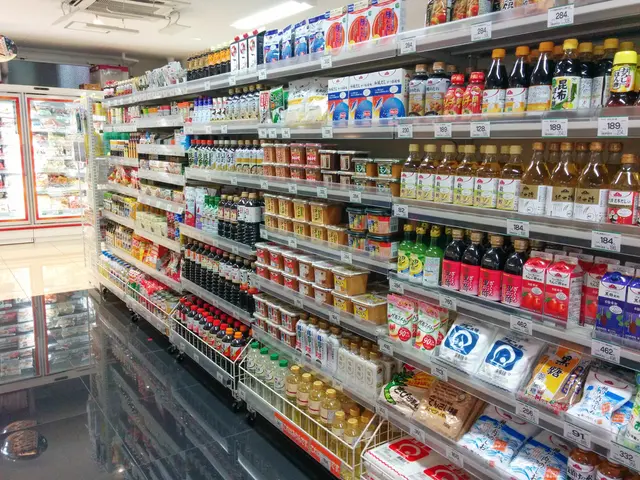Punjab evaluates the Wheat Policy for 2026, due to a drop in production and regulatory issues within the sector.
In a recent meeting, key stakeholders discussed strategies for addressing the current challenges in wheat production and market stabilization in Punjab, Pakistan. These challenges include declining wheat production, reduced sowing areas, water shortages, and the absence of a minimum support price (MSP), among others.
Punjab's wheat production fell to approximately 22.05 million metric tons from 16.25 million acres in the 2024-25 season, a drop that mirrors a national decline of 4.52% in production and a 6% reduction in area sown[1]. The Indus River System Authority has warned of a 16% water shortage for winter crops like wheat, which could further impact yields negatively[2].
The policy shift towards full deregulation of wheat procurement, with no MSP announced for the 2024-25 season and the cessation of public-sector procurement, has left farmers vulnerable and dependent on market prices that have been volatile and low during surplus periods[1][4]. This has led to financial strain and farmer protests[3][4].
Proposed solutions include the wider adoption of an Electronic Warehouse Receipt (EWR) and commodity trading system, intended to promote financial inclusion for farmers and enable better access to credit by using stored wheat as collateral. However, these initiatives have been delayed[1]. Another solution is a Rs100 billion financing facility for flour millers and grain license-holders to encourage bulk wheat purchases and stabilize the market, also facing implementation delays[1].
The meeting also considered the utilisation strategy for the 0.89 MMT wheat currently in government stocks, with proposals for initiating the outsourcing process and hiring Collateral Management Companies (CMCs) to manage these stocks[5]. The plan includes wider adoption of the EWR scheme through the outsourced godowns. Suggestions were made for integrating digital platforms to connect farmers, warehouse operators, and financiers, thereby improving price transparency and reducing the influence of speculative hoarding.
The session was attended by the Minister for Agriculture Punjab, Special Assistant to the Chief Minister on Price Control & Commodities Management, Chief Secretary Punjab, secretaries of Agriculture, Finance, and Price Control departments, the President of the Bank of Punjab, and the Director General Food/Cane Commissioner.
Farmers and associations are urging the government to announce an MSP above Rs4,500 per 40 kg to incentivize sowing and achieve production targets, especially with sowing areas reportedly shrinking by over 30% this year due to reduced procurement targets[2].
In summary, Punjab faces the twin challenges of declining wheat production driven by fewer sowing areas and water shortages, and market instability due to deregulation and the absence of guaranteed prices. The government's solutions revolve around modernizing market infrastructure, increasing financial support to farmers and millers, and exploring export opportunities. However, delays in implementation and the lack of an MSP announcement remain key obstacles to stabilizing production and markets[1][2][3][4].
References: [1] Dawn.com, 2025. "Govt to outsource 947 vacant godowns for wheat storage." [online] Available at: https://www.dawn.com/news/1682695
[2] The Express Tribune, 2025. "Punjab wheat production falls by 6%." [online] Available at: https://tribune.com.pk/story/20252/punjab-wheat-production-falls-by-6-percent
[3] Business Recorder, 2025. "Punjab govt to outsource 947 vacant godowns for wheat storage." [online] Available at: https://www.brecorder.com/news/342083-punjab-govt-to-outsource-947-vacant-godowns-for-wheat-storage
[4] The News International, 2025. "Farmers protest against wheat procurement policy." [online] Available at: https://www.thenews.com.pk/print/832603-farmers-protest-against-wheat-procurement-policy
[5] The Express Tribune, 2025. "Punjab govt to outsource 947 vacant godowns for wheat storage." [online] Available at: https://tribune.com.pk/story/20252/punjab-govt-to-outsource-947-vacant-godowns-for-wheat-storage
- The government's proposed financing facility of Rs100 billion for flour millers and grain license-holders, aimed at encouraging bulk wheat purchases and stabilizing the market, is facing implementation delays, similar to the digital platforms integration plan and the wider adoption of the Electronic Warehouse Receipt (EWR) system.
- In light of declining wheat production in Punjab and the national level, due to reduced sowing areas and water shortages, and the absence of a minimum support price (MSP), the government is urged to announce an MSP above Rs4,500 per 40 kg to incentivize sowing and achieve production targets.
- The national finance and business communities should take note of Punjab's wheat production scenario, as these challenges can potentially impact the world market if not addressed promptly, considering Punjab's significant contribution to global wheat exports.








